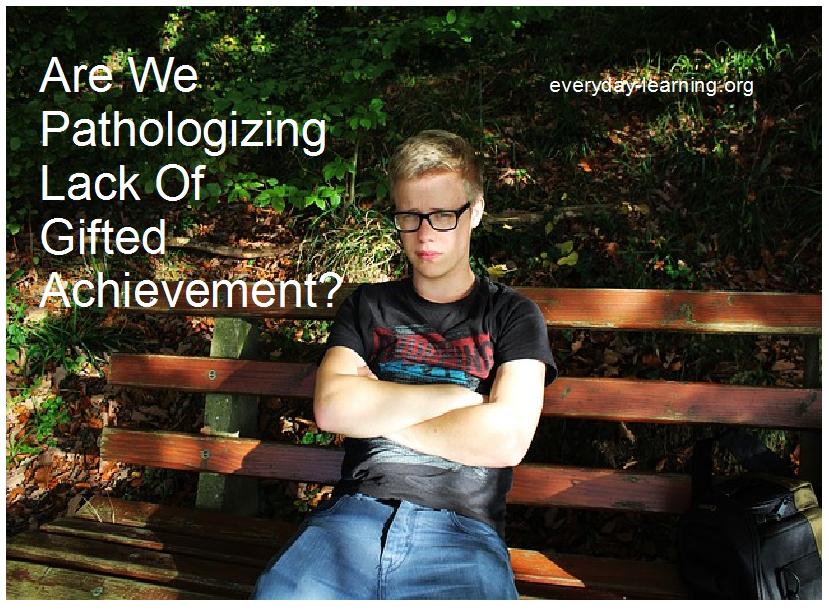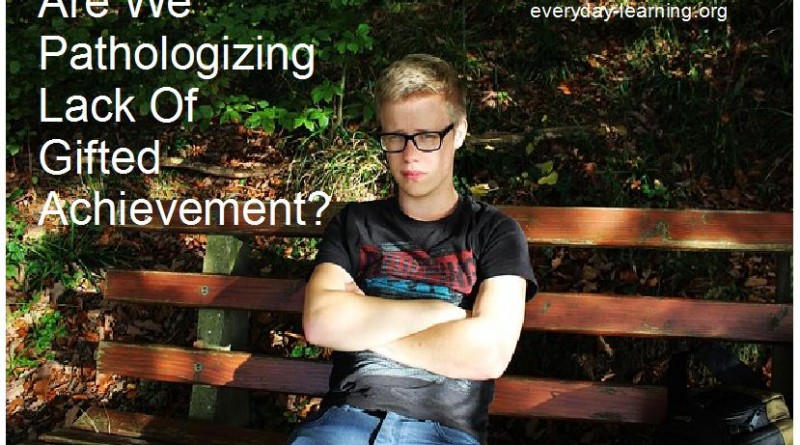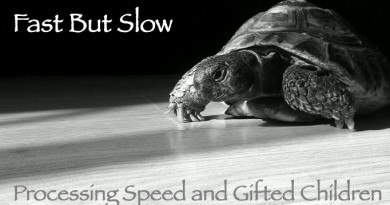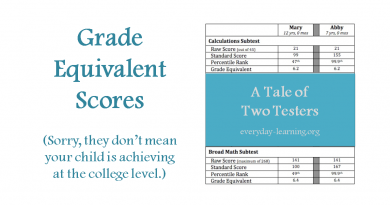Are We Pathologizing Lack Of Gifted Achievement?
Dr. Steven Pfeiffer recently wrote Lessons Learned from Working with Gifted and Creative Kids” for The Creativity Post. In his article, he talks about his impressive 35-year career which has led him to certain “truths” he shares about gifted children. He says:
The first lesson is that development of talent among highly gifted and highly creative kids requires more than intellectual ability, more than what I call, ‘head strengths.’ The second lesson that I’ve learned over the years is that success in adult life requires both head strengths and heart strengths.
On the surface, this imparted wisdom feels well-intentioned. Any of us who have worked or lived in the gifted world know that all too often parents jump on the achivement-by-proxy bandwagon and begin plotting how their taglet is going to find the cure for cancer before their 21st birthday. Some of them, I suspect, even harbor sweet dreams of how their child will one day stand on a podium and thank them for having sacrificed so much so they could be where they are at that moment.
The reality is, just like we see in the professional sports world, many of our gifted and highest intellectual ability kids might make it to the big leagues of academia, but few will actually make monumental achievements. Does that mean they did not have enough “head strengths” or “heart strengths”? Not necessarily.
Dr. Pfeiffer goes on to wax about how some gifted children also lack “strengths-of-heart”, which he defines as including:
- Humility
- Compassion
- Gratitude
- Enthusiasm
- Concern for others
- Concern for the larger world
- Kindness
- Playfulness
He adds, “Research in our lab and my own clinical experience strongly suggest that these heart strengths often can make a real difference in whether a gifted or creative kid grows up to be a happy, well-adjusted, and successful adult.”

And this is where I find myself uncomfortable with Dr. Pfeiffer’s piece. Dr. Pfeiffer literally tacked that last sentence on to his blog post, with no real elaboration – other than to say that heart strengths are not emphasized in today’s classroom. So, does that mean gifted kids are at fault for growing up cocky, ungrateful, and with little ability to relax and hang out?
NO, NO, NO, and NO, again! Please tell me a clinical psychologist who is influential in the world of gifted education and training others in the field is not suggesting that gifted kids fail to grow into happy and successful adults because they lack enthusiasm and a concern for the wider world.
In my opinion, why so many gifted children do not go on to extraordinary careers – or even happy adulthoods – has more to do with the pressure the talent development model that the leaders of the National Association of Gifted Children (NAGC) keep pushing as a priority in gifted education. Parents and teachers have been fed a lie that we need to find as many opportunities as possible to promote gifted student’s achievement as early in life as possible so that they can go on to make contributions to the world. Even Dr. Pfeiffer pushes the notion that “full development and actualization of talent at its highest levels requires … ‘eating bitterness’ … tremendous amount of practice … and stick-with-it-ness”.
 |
 |
 |
The problem with the talent development model is that few 7-, 10-, or even 13-year olds really know what they want to do when they grow up. Just because a kid developed a passion for biology at a young age does not mean they want to become a neurosurgeon before they turn 25. When a taglet does not go on to great fame in an early area of interest, it does not mean they failed to stick with their passion. In some (most?) cases, the kid probably just grew up and discovered other interests that they would rather pursue.
Regardless, talent development proponents look at early interests as an opportunity to fast-track gifted kids into potential careers. The kids are fed self-esteem building messages. They’re groomed to compete in contests. And worse, because of the pigeon-holing, the kids don’t get the opportunity to continue to sample other areas of academic and personal interests.
Think about it: How would you feel if your entire K-12 academic identify centered around being the person who was going to one day win a Nobel Prize in Physics – and then you get to college and you realize that, really, what you want to do with your life is write science fiction?
Frankly, many kids won’t have the balls to tell anyone the truth. These talent-development gifted kids have been conditioned to focus on big prize recognition. Suddenly waking up at the age of 17 or 20 and realizing you don’t want to be what everyone has told you you are can absolutely lead to depression. Educators, parents, and clinicians need to understand it is not “underachievement” when a youthful passion transforms into a more authentic desire to live one’s life in a manner that other people might not understand.
If we have a true concern about the mental health and well being of our gifted children, then perhaps we need to stop pathologizing gifted children who don’t achieve to other people’s expectations. Instead of calling these young people ungrateful or uncommitted, let’s instead celebrate their tenacity and desire to be their own person. More importantly, let’s focus on helping them choose the goals they want to purse, not the goals other people think they should pursue.




Alessa,
I also found it quite interesting that the list was given, but no thought as to why gifted kids (and adults) struggle with these “strengths-of-heart”.
I had SOOOO many of these as a strength as a gifted child until it was beat out of me at school. “Humility” meant not talking about my strengths, “gratitude” meant I didn’t appreciate how I was under-served, “concern for others” meant putting myself behind the needs of others, “concern for the larger world” meant that working for my goals was “selfish”. “Kindness” meant that I was a braggart for having pride and again, not putting others’ feelings first.
Humility
Compassion
Gratitude
Enthusiasm
Concern for others
Concern for the larger world
Kindness
Playfulness
As you can see, I still struggle to feel like I’m not going against the world at times. My Gifted Adults group reminds me that I’m not alone. Never being identified and never being supported can take a toll on giftedness. Many gifted educational programs are failing to support the emotional needs of gifted children which directly affects their “strengths-of-heart”.
For me, the point of education generally and gifted education in particular is to enable students to discover, nurture, and achieve *their own* identity and goals rather than any thrust upon them.
Each individual should have the opportunity to define success for themselves. Ideally, that would include a desire to give back to the community in the manner of their choosing but no one *owes* society the products of their imagination or the fruits of their labor.
For the record, I do not think that focusing on the conditions that foster the development of talent necessarily imposes an obligation to develop those talents or put them in service to the greater good. Nor do I think that is what Steven Pfeiffer’s column or final comment suggest.
All that being said, I recognize that some educators, parents, mentors, and members of society do foist their lofty dreams and expectations onto children who show early promise. That is unfortunate but it should not damn the entire enterprise of identifying the conditions and practices that enable students to realize their own dreams.
I am *so* glad you wrote your article with the question title, “Are We Pathologizing Lack Of Gifted Achievement?” I’m not sure of the answer, but it’s an excellent question.
Although I find Steve Pfeiffer’s article caring and informative, I’m keenly aware of the dangers of which you write. Yes, give kids opportunities to expand their heads and their hearts, but don’t do what some have tried to do with NAGC—focus unduly on talent development.
For more information, see NAGC Conceptual Foundation Network’s newsletter from about five or six years ago—-it’s a newsletter that NAGC itself never placed on its website despite the fact other newsletters were placed there, and despite the fact I asked numerous times for it to be placed on the NAGC website. Various articles in the newsletter, including mine, explain the controversy that still exists within NACG. I gave permission for a friend to post my article from that newsletter here: http://peregrine.net/Wenda's_Article_NAGC_Conceptual.pdf
From the article:
“In this article, I share my reflections on (then NAGC president) Paula Olszewski Kubilius’ proposal “that we take a bold step and consider making talent development, rather than giftedness, the major unifying concept of our field and most importantly, the basis for our practice.” I start with my first reaction — one questioning whether Olszewski-Kubilius and I speak of the same “field.” In the middle, I offer reflections on achievement, giftedness, elitism, and more. I argue that if NAGC takes a Bold Step towards nonmarginalization, NAGC will no longer adequately represent our children in the margins. I end with my contention that bold steps are best taken on new paths.”
And more:
“Achievement-based definitions fail when examined under microscopes of equity. Just as history is written by victors, so too is excellence defined by those at the top of the socio-economic and education heaps. By failing to provide opportunities and support to those who show promise but are not yet consistently achieving in line with their potential, we create and widen the achievement gap among our most capable students.”
What an insightful link, Wendy. Thanks so much for sharing. I think many would agree that your fear has materialized similarly to your prediction.
I was one of the inaugural members of our district’s gifted program when I was in junior and senior high school, back in the late 1970s-early 1980s. At that time, the focus was mainly on giving us more ‘meaty’ projects to get involved with, along with our regular classroom work. We didn’t yet have AP classes, or opportunities to earn college credit or even to skip grades. We students dealt with harassment from other students as well as from teachers, and it caused some kids to leave the program. We were all expected to do great things, and there was great competition for scant scholarships, grants, and loans. Very few of us went on to achieve ‘great’ things, by most standards, but not because we didn’t have talent development programs, or because we didn’t have ‘heart strengths.’
Gifted kids come from families who have the same problems other families have: financial problems, substance abuse problems, mental health issues, physical health issues, divorce, abuse. Being gifted is not the primary thing in that kid’s life. A number of the kids in my original group didn’t make it through college, even with scholarships. I was one of them. It had everything to do with my family, and nothing to do with my will to succeed. What a lot of success-focused people seem to forget is that all kids, gifted or not, are a product not only of their schools, but of their homes as well. This is also where they may or may not develop their ‘heart strengths.’ I do agree that if a child’s giftedness is not ‘trained’ wisely, that child will develop in an emotionally and psychologically unhealthy way. S/he may very well grow up anxious (about the need to always succeed), perfectionist (so that they will always be worthy of love), unempathic towards those who struggle with things they find easy, non-resilient when they themselves struggle, etc.
No, I did not earn a degree, despite continually taking college classes. I am a top performer in my job. Despite undiagnosed and (until recently) untreated ADHD, I kept many balls in the air, caring for a disabled loved one, taking care of my child, working full-time and coping with my own health issues, as well as the end of a marriage. During that time, I even earned multiple bonuses at work. I have volunteered for my son’s schools and for various charitable organizations, and I have worked hard to deal with the scars of my family-of-origin issues. I know that in their own way, the results of these things have had their own value in this world. However, I suffered a head injury, and afterwards I was being interviewed as part of my neuropsych eval. The psychologist asked about my earlier years and school achievements in order to help establish my intelligence prior to the injury. When I told him of my ‘giftedness,’ scholarship, etc., and he found out I didn’t get my degree (or more), he shook his head sadly and said, “Hmmm, you’re quite an underachiever, aren’t you?” It stabbed me right in the heart. To him, none of the things I’ve struggled to overcome and not pass on to my child, none of the care I’ve given loved ones, none of anything I have done meant anything to him because I didn’t ‘achieve.’
My wish for those who work in gifted education and/or who have gifted kids is this: Please remember that kids have much more to learn about living a good, healthy life besides learning how to do advanced math, or how to create cures for cancer, or how to compose symphonies. There are many other obstacles that life will throw in their way, just as it throws obstacles in the way of the ‘non-gifted.’ We adults owe our kids much more than programs. We owe them solid, healthy homes from which they can go forth, prepared for whatever they will have to deal with as human beings. And we owe them respect for whatever they do accomplish, even if the only prize awarded is mental and physical health, and a modicum of happiness in this world. That alone is a pretty big deal.
Yep.
I’ve found what I’ve read about ‘giftedness’ – from whatever perspective – somewhat dehumanising.
That said, I would call it cursedness anyway.
I have to wonder if Dr. Pfeiffer has ever actually met a gifted child or a parent of a gifted child or maybe Dr. Pfeiffer needs to realize that during his research he is going to encounter a lot of gifted kids and parents of gifted kids, who’ve had to keep quiet. When they speak to him they think he’s interested in them and their kids so this is their opportunity to say things they’ve held back. As a psychologist he should recognize that, but clearly he doesn’t.
As the parent of three gifted children and someone who advocates for gifted children, I don’t recall ever meeting a gifted child who didn’t have most , if not all of those “strengths-of-heart” qualities – however, I do think Dr. Pfeiffer lacks them. I have met a couple of parents who brag about their gifted child but most don’t because they know it’s okay to talk about an elite athletic child but no one wants to hear about a smart kid.
In my view Dr. Pfeiffer is one of the reason’s 2E and underachieving gifted children are not getting the support they need from the education system – he and his research is causing harm to gifted kids.
I love it when someone questions something everyone’s taking as an accepted ‘truth’, and I love every word you’ve written here. Serial passions are common among the gifted. As an adult I can certainly identify, and I love watching as my kids throw themselves into something until they’ve had enough and then move on to something else.
Also, my 2e kid has those strengths-of-heart but sometimes they’re hard to see under his intensity and sensitivity. It’s only by supporting an accepting him as he pursues his own path that those strengths will have a chance to flourish.